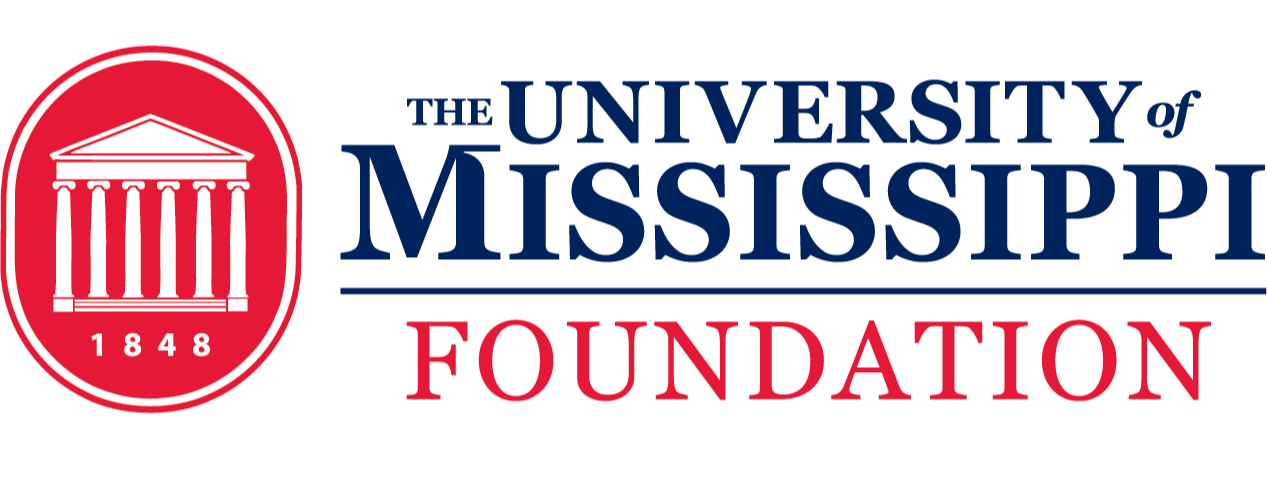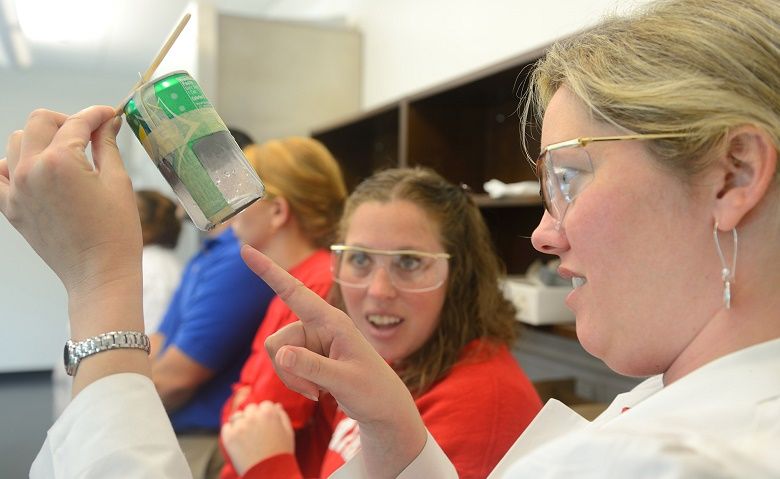The Robert M. Hearin Support Foundation of Jackson, Miss., has made generous awards to the University of Mississippi’s Center for Math and Science Education and toward scholarships at UMMC.
The first award of $1.6 million went to the UM Center for Mathematics and Science Education to support its efforts to improve education in science, technology, engineering and math (STEM) statewide over the next three years.
The grant marks the third time Hearin has renewed funding for the influential center, which celebrates 10 years of service in December.
“For us, this is affirmation that our work is having a real and positive impact,” said John O’Haver, CMSE director. “We’re proud and grateful for the Hearin Foundation’s support of our mission to improve the STEM pipeline flowing throughout our state.”
Established in 2006, the CMSE is part of the UM School of Education and provides professional development for more than 1,000 Mississippi STEM educators each year as well as a variety of hands-on STEM education programs for thousands of K-12 students. The CMSE has a direct impact on more than 66 percent of public school districts in Mississippi.
Over the next three years, CMSE staff plan to work more closely with the UM Department of Teacher Education. Through the grant, the center will collaborate with the department’s existing “Grow as a Group” initiative, a study of the professional development partnership possibilities when a school has a mathematics student teacher from UM who is part of its yearlong student teaching program.
The program will help bring professional development opportunities to teachers at schools where student teachers are placed. The development activities will be conducted by UM graduate students working in the field with student teachers. This initiative aims to provide updated skills and knowledge to teachers who do not have time to attend training away from their school site.
The new grant also will help provide scholarships for K-12 students to attend numerous camps and learning activities at UM.
In addition to professional development and K-12 STEM programs, the CMSE has provided valuable research fellowships for graduate students that have helped the university increase the number of earned Ph.D. degrees in mathematics education by 790 percent over the past nine years.
Alumni of the CMSE fellowship program work as faculty members at K-12 and post-secondary institutions across the state and beyond, including Blue Mountain College, Middle Tennessee State University, Mississippi State University, Mississippi College and the University of Arkansas at Pine Bluff, as well as at Ole Miss.
Other accomplishments by the center include:
- Redesign of mathematics content courses for UM education majors
- Introduction of National Science Foundation’s Robert Noyce Teacher Scholarship Program at UM
- Launch of FIRST Tech Challenge Robotics competitions for middle and high school students statewide, with 975 percent growth over four years
- Development of a portable planetarium program that has benefitted more than 7,400 students since 2012
- Establishment of UM’s MathCamp, Engineering Camp, ASM Teacher’s Camp and STEM Competition and Trebuchet Competition
- Launch of more than 10 major professional development programs for teachers, including UM’s Mathematics Specialist Conference, Project PrIME, the MaPLES Initiative, the DEEP Learning Communities Project and UM Common Core Workshop series.
“From the start, we’ve had this vision of providing good work that benefits the state of Mississippi,” said Alice Steimle, CMSE associate director. “I like knowing that the hard work and the effort that we’ve put in has been recognized and is making an impact.”
Additionally, the Robert M. Hearin Support Foundation has awarded a pair of multiyear grants to the University of Mississippi Medical Center to help ensure the state's "best and brightest" dentistry and allied health professions students have the opportunity to stay in Mississippi to obtain their respective degrees.
The School of Dentistry received a four-year, $510,500 grant for its Best and Brightest Scholarship Program, while the School of Health Related Professions obtained a five-year, $250,000 grant for its Mississippi Rural Allied Health Professionals Scholarship Program.
Two high-achieving applicants to the School of Dentistry will be selected each year to receive the Best and Brightest Scholarships of $25,525 each, in exchange for their commitment to practice in Mississippi for a minimum of five years upon completion of their dental education.
Up to five students enrolled in any of SHRP's two-year academic programs may be selected for the Mississippi Rural Allied Health Professionals Scholarships, based on their sincere interest and commitment to rural health in the state.
The UMMC faculty who authored the grant proposals believe the scholarships will help attract the state's top academic talent to their respective schools.
After serving on the School of Dentistry's admissions committee for several years before becoming dean of admissions and student affairs, Dr. Wilhelmina O'Reilly became frustrated with a disturbing refrain.
"We were constantly losing our best and brightest students to schools outside the state because we could not compete with the scholarships they offered," said O'Reilly, professor of pediatric dentistry and community oral health. "A lot of students we brought in to the school to visit said they'd love to stay here to train, but they just weren't able to for financial reasons."
So she decided to meet the issue head-on.
O'Reilly wrote a grant proposal for the Hearin Foundation's consideration, and she included one compelling argument.
"When students go to other states for their training, normally, they don't come back here," she said. "These students are very desired – other schools want them as much as we do.
"We've got to have something to fight with."
O'Reilly patterned her proposal after the school's scholarship for minority students, also funded by the Hearin Foundation, which requires the recipients to practice in Mississippi once their dentistry training is completed.
"It's been a great help for diversity efforts in our recruitment," O'Reilly said. "After we got that grant, a representative from an out-of-state school asked us, 'Why can't we steal your students anymore?'"
Dr. Gary Reeves, dean of the School of Dentistry, has seen his share of dentistry students slip from the school's grasp.
"I have been here at the school for over 30 years, and during that time, I have seen many exceptional academically gifted students leave Mississippi to complete their dental education at schools that did offer them academic scholarships," Reeves said. "We are very grateful to the Hearin Foundation for providing the future dentists of Mississippi with these dental academic scholarships, and we are also grateful to the foundation for their past and continuing support for minority dental education in Mississippi."
The first two awardees of the merit-based dental scholarships are entering class this fall. Austin Huffman of Tupelo and Mary Catherine Reynolds of Purvis were selected by the school's scholarship committee as the first Best and Brightest Scholars.
"These students staying in Mississippi are serving the citizens of Mississippi and will have a great impact on the state economically as they set up their practice, obtain space, purchase supplies, pay taxes and donate to charitable and community organizations," O'Reilly said. "We will have the most promising students staying to be part of the academic medical center here."
Which could bear additional intellectual fruit.
"There is a shortage of students wanting to teach," O'Reilly said. "We have a strong research component in the school, and that really helps. But a lot of our faculty are getting older, and we need to attract top students into the teaching arena.
"We are in need of instructors in the school, so we would love to have our top students here and exposed to this academic environment. This scholarship is definitely a recruitment tool we can use to show that teaching here could be a possibility for them, too."
Look no further than the dean's office in the School of Health Related Professions to understand the importance of exposing top students in the state to the allied health professions.
As a young student in a rural area of Mississippi, Dr. Jessica Bailey had never considered allied health as a profession until a family friend suggested it might make a fine career choice.
"Somebody gave me an opportunity that I may not have even known about," recalled the SHRP dean. "That's why this scholarship is so near and dear to my heart. A lot of our students come from rural areas. Whenever I see a new class roll, it's always amazing to see the little towns that are represented.
"I look at students today and think, 'What opportunities do they have? Do they see beyond the city limits where they grew up? Often they have the capacity to do something, but they need the resources to make it happen."
Obtaining those resources was the mission of Dr. Juanyce Taylor, assistant dean for research and innovation and chair and assistant professor of health sciences, when she developed the proposal for SHRP's first Hearin grant.
The scholarship aims to identify, recruit and enroll undergraduate and graduate allied health students who demonstrate the necessary interest, commitment, aptitude and academic achievements to pursue careers as allied health professionals in rural or medically underserved areas of Mississippi.
"We're trying to find ways to help our students, and we recognize those coming from rural areas are more likely to be from lower socioeconomic status," Taylor said. "It is important for us to attract and retain the top students from these areas so they won't have the burden of trying to pay for school."
What sets the scholarship apart is its service component – students don't just stay in Mississippi to earn their degrees: in many instances, they can remain in their own hometowns to provide care where it's needed most.
"We hope to identify faculty mentors for these students and to place them in rural locales," Taylor said. "We want to establish a connection with the school. And as we continue to strengthen our alumni efforts, this would provide an excellent opportunity for our students to connect with our school after they graduate by serving as mentors for these scholarship recipients."
The first recipients have yet to be identified – a SHRP advisory board is expected to announce its selections in November – but Taylor said the competition to be among the school's first Hearin scholars is sure to be strong.
"To have such an award from such a distinguished organization that focuses on the economic development and growth of our state is important," Taylor said. "It speaks to their integrity and compassion for the citizens of our state.
"Scholarships in the health professions are not easy to come by. The fact that this institution is moving to a more integrative model of health-care instruction is important for others to recognize the allied health professions' role as the glue that helps sustain our health-care workforce."

